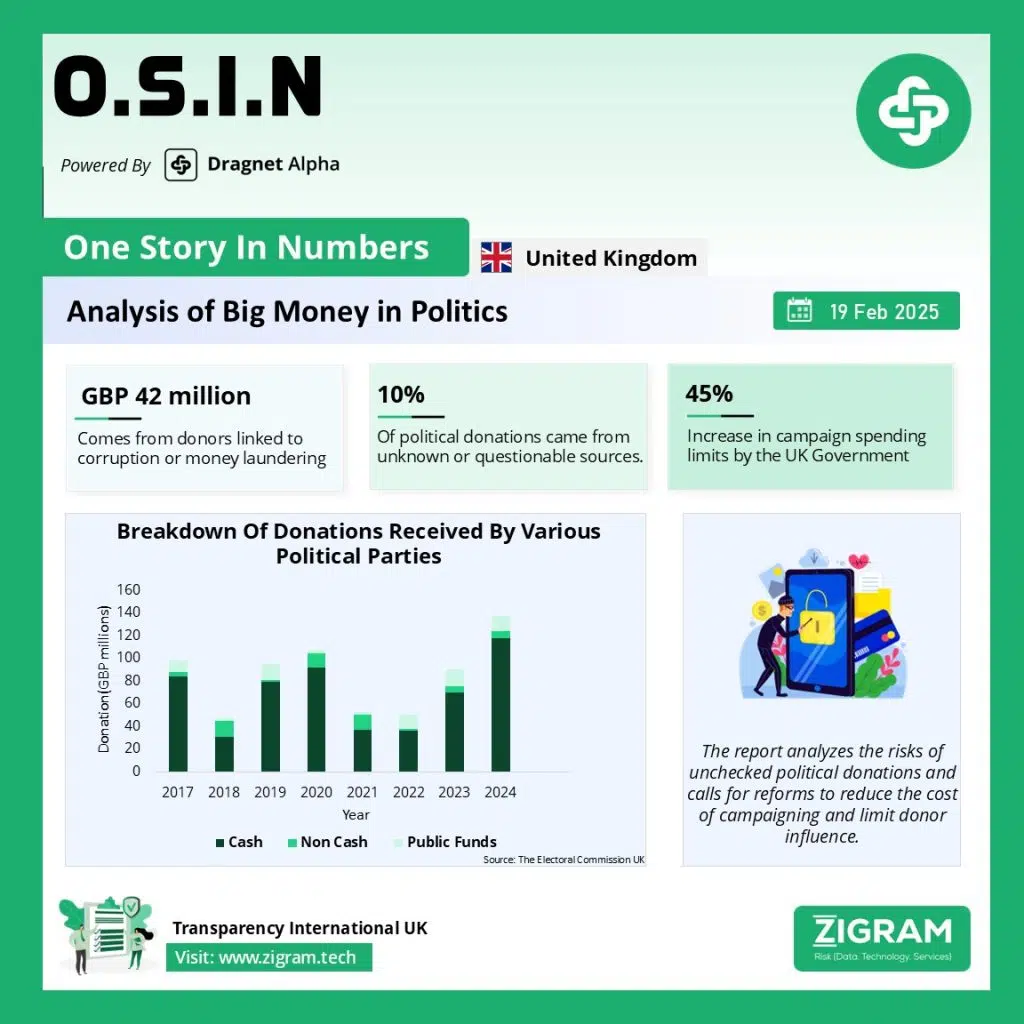The Rising Influence of Big Money in UK Politics
A Growing Dependence on Wealthy Donors
Currently, there are no limits on how much any individual or company can give in politics. Under growing pressure to find money, some parties have become increasingly reliant on a dangerously small number of donors who provide a significant proportion of their income, especially around UK general election years. And the amount of money overall is growing, seemingly exponentially.
In 2001 when records began, parties reported a total of £30.6 million in donations from private sources, £17 million (55 per cent) of which came from nine individuals, companies and trade unions giving £1 million or more in a year. By 2023, this had ballooned to £85 million in reported contributions from private sources, with £56.5 million (66 per cent) coming from just 19 mega donors. One donor alone accounted for one in every eight pounds reported in donations during the year. Notably, the surge in reported donations, particularly from ‘mega donors,’ occurs around the time of major electoral events.
The Perception of Influence
While targeting the super-rich to fund political campaigning is tactically expedient, it risks further damaging an already fragile trust in our democracy. A 2024 YouGov survey found 79 per cent of respondents believed wealthy donors made political contributions to gain influence. Similar surveys over the years have consistently shown that the public feels big donors exert undue influence while ordinary people have little say in political decisions.
The last few decades are littered with examples that support this view. Failing to address parties’ rising reliance on a tiny minority of high-net-worth individuals will only reinforce the perception, or indeed the reality, that politicians are captured by a small group of plutocratic interests.
The Case for Donation Caps
To address this threat to trust, the Committee on Standards in Public Life (CSPL) recommended a cap on donations of £10,000 from any individual or organisation per year to any political party. The Organisation for Security and Co-operation in Europe (OSCE) echoed this sentiment, arguing that donation caps are an effective way to reduce the risk of corruption and the “purchase of political influence.”
Introducing caps would require rethinking several aspects of the current political donation framework, including:
• The treatment of contributions from companies, LLPs, co-operatives, trade unions, and unincorporated associations.
• Whether to apply a universal cap or set different limits for candidates, non-party campaigns, and other regulated actors such as MPs.
• Transitional arrangements to help parties adapt their fundraising strategies.
• Measures to detect, pursue, and deter attempts to evade the cap.
Addressing Concerns About State Funding
One of the primary arguments against donation caps is that limiting private contributions would necessitate additional public funding, which many see as undesirable. However, this argument is misleading. Political parties could increase their reliance on small donations from members, which some parties already do successfully. New technologies have also enabled more efficient voter engagement, reducing the cost of campaigning.
The Challenge of Questionable Donations
Currently, there is no clear policy on handling donations suspected of being linked to criminal activity. Though relatively infrequent, these cases can have a major impact on political reputations. While some parties claim to have due diligence policies, these are not legally required and have often proven inadequate.
Even if the law mandated “know your donor” policies, it would only address the issue technically rather than tackling the fundamental ethical concerns. Similar challenges exist in enforcing anti-money laundering regulations, where compliance with the rules does not always prevent unethical behavior.
A Path Forward
Removing big money from politics would simultaneously reduce the risk of corruption and restore public confidence in democracy. The financial benefit of accepting questionable donations currently outweighs the risk, but if donation caps were introduced, the financial incentive would be significantly smaller, shifting the risk-reward calculus.
The time for action is now. Political parties must move beyond rhetoric and take meaningful steps to limit the influence of big money before trust in democracy erodes further.
Read the full report here.
Please read about our product: Dragnet Alpha
Click here to book a free demo
- #PoliticalDonations
- #MoneyInPolitics
- #CampaignFinance
- #Democracy
- #Transparency
- #ElectionFunding
- #PoliticalReform
- #FairElections
- #BigMoneyPolitics
- #TrustInGovernment
- #PoliticalEthics
- #DonorInfluence
- #CleanPolitics
- #UKPolitics
- #PartyFunding
